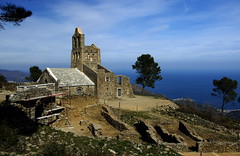 As some of you know, I’m ministering at the Federal Prison: FCI Schuylkill.
As some of you know, I’m ministering at the Federal Prison: FCI Schuylkill.
1,330 male inmates. Our class has 31.
I gain so many insights from my brothers there. So, it seems a terrible waste not to share some of them here.
We just finished up on lesson on Finding Your Mission.
We talked about what Jesus’ mission was. We talked about our own missions.
Some of them hadn’t thought of the concept and surely didn’t like it apply to them behind bars.
… if you are in prison, it’s really high time you find your mission…
But, that’s true for all of us.
I’m learning right along with them. The pressure is higher to learn lessons to help and heal you when you live behind bars, but the lessons themselves tend to be quite the same.
So far, the ground is fertile and the spiritual thirst is fervent!
The hearts of the those who choose to come on Monday’s is “the good soil”!
(If it was half of this at church the world WOULD be on fire with it!)
MISSION for inmates?
In reading the verse that is essentially Jesus’ mission statement (and also a prophecy from Isaiah) I realized that I have the same mission. It came into sharp focus.
“I’m setting literal captives free with the Good News.”
Jesus came, taught, brought and lived the Good News, died, rose, and then…left.
He didn’t stay where everyone would surely try to force him to be king (or pope, or whatever). Everyone still wanted to be free of the Romans. Except for a few of his students and friends and a few family members, everyone would be missing the point.
The Jews were captives of the Romans. That didn’t change when Jesus was here or after he left.
The Kingdom of God doesn’t free you in that way.
The invitation was (and is) to be free from the captivity of sin and death and the mindsets that keep us imprisoned (or in the case of my brothers…it puts you in an actual prison).
The Good News was and is the hope, the reality, the plan fulfilled: that God came to reconcile us to him, forgive us, and make things right. Little by little we carry it out and remake the world.
Little by little we provide the impact of authentic justice in the world.
It starts, for me, in jail along side my brothers. As these men transform, so will their world and the world, at large.
What a joy it was to tell my brothers that they are truly missionaries with a genuine mission behind the bars!
They are light in a dark place.
No time is wasted.
They are NOT just doing their time; The are making up for wasting it.
Their mission has begun, and no one can stop it. Once you’ve been set free, you are free indeed!
Jesus is our model and so is his mission.
Are you doing time too? Or are you on your mission?
Luke 4:14
Then Jesus returned to Galilee, filled with the Holy Spirit’s power. Reports about him spread quickly through the whole region.
15 He taught regularly in their synagogues and was praised by everyone.
16 When he came to the village of Nazareth, his boyhood home, he went as usual to the synagogue on the Sabbath and stood up to read the Scriptures.
17 The scroll of Isaiah the prophet was handed to him. He unrolled the scroll and found the place where this was written:
18 “The Spirit of the Lord is upon me, for he has anointed me to bring Good News to the poor. He has sent me to proclaim that captives will be released, that the blind will see, that the oppressed will be set free, 19 and that the time of the Lord’s favor has come.[f]”
20 He rolled up the scroll, handed it back to the attendant, and sat down. All eyes in the synagogue looked at him intently.
21 Then he began to speak to them. “The Scripture you’ve just heard has been fulfilled this very day!”
If you can help us, we need it. Badly. Monday nights 6-8:30. Let me know!


